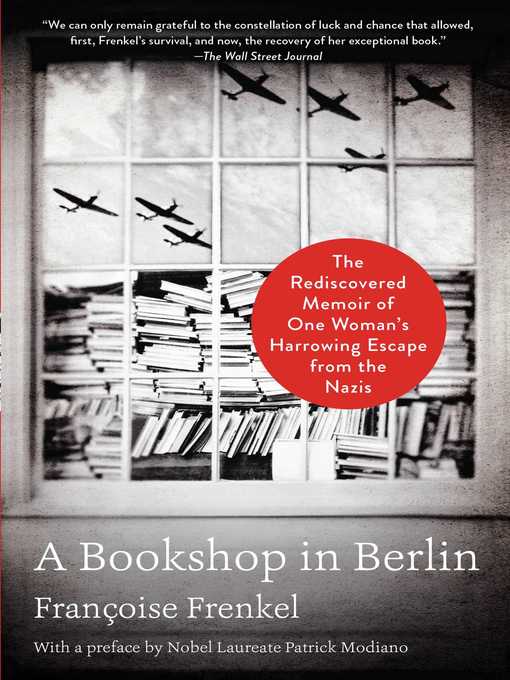
A Bookshop in Berlin
The Rediscovered Memoir of One Woman's Harrowing Escape from the Nazis
کتاب های مرتبط
- اطلاعات
- نقد و بررسی
- دیدگاه کاربران
نقد و بررسی

October 14, 2019
In this riveting memoir, rediscovered nearly 60 years after its original publication, Jewish bookseller Frenkel documents her harrowing experience escaping Nazi persecution in WWII France. Born in Poland in 1889, Frenkel fulfilled her dream of opening a French-language bookstore called Le Maison du Livre in Berlin in 1921. She fled to Paris after Kristallnacht on Nov. 10, 1938, and escaped Paris in 1940 when the Germans occupied the city. Seeking refuge in Southern France, Frenkel experienced threatening situations while Nazis were “hunting” humans and was smuggled from one safe house to another. She witnessed children being separated from parents and Jews being shipped to camps; while trying to sneak into Switzerland in 1942, she was arrested and held in a French detention center. She was tried for attempting to illegally cross the border and acquitted, and in 1943 successfully found her way into Switzerland, where she began writing her memoir, No Place to Lay One’s Head. After the war—and the book’s publication—Frenkel returned to Nice. Frenkel, who died in 1975, writes that it is “the duty of those who have survived to bear witness to ensure the dead are not forgotten.” Frenkel’s remarkable story of resilience and survival does just that, and will truly resonate with readers.

Starred review from November 1, 2019
The potent story of a Jewish woman who fled, hid, endured imprisonment and debasement, and eventually escaped to Switzerland in June 1943. In a republished volume that has enduring relevance, Frenkel (1889-1975), who originally produced her long-forgotten and recently rediscovered work in 1945 (original title: No Place To Lay One's Head), chronicles her life before and after the Nazis rose in Germany and invaded France. As the new title suggests, she was a bookshop owner. She tells about her early love for books and her decision to go into the business--and to locate that business in Berlin, where she found no shops specializing in French literature (her love). When the Nazi oppressions grew more severe in Germany, she returned to France, where conditions were tolerable--at least for a while. Then she was forced to hide with sympathetic gentile friends, but she soon realized France was no longer safe, so she resolved to escape to Switzerland. She was apprehended in the process and spent time in custody before, miraculously, a judge freed her after a brief trial. A bit later, she made a second attempt to cross the border and succeeded despite gunfire and a near recapture. Frenkel, who originally wrote the book not long after her escape, is a fine writer: detailed, emotional, and careful about giving her readers sufficient information to keep the tension taut and not overwhelm. The current edition features some useful additions, including a chronology and a "dossier," a compilation of some research to validate what the author wrote, as well as a preface by French novelist and Nobel laureate Patrick Modiano. Pictures, photocopies, and translations of documents comprise nearly 30 pages of engaging and relevant backmatter. A compelling account of crushing oppression, those who sought to flee it, and those who, at great risk, offered help.
COPYRIGHT(2019) Kirkus Reviews, ALL RIGHTS RESERVED.

Starred review from November 15, 2019
Born in Poland and educated in Paris, author Frenkel opened the first French-language bookstore in Berlin in 1921. It soon became an extremely popular destination for writers and poets, and counted embassy officials and well-known intellectuals among its clients. Despite its fame, the shop and Frenkel (who was Jewish) became victims of the Nazi purges of 1939, resulting in the shuttering of the shop and Frenkel's hasty flight to France. Thus began a nightmarish four-year odyssey of scrambling to secure proper papers, seek safe havens, and avoid capture and deportation to a work camp. Frenkel's chronological first-person narration details narrow escapes, serendipitous respites, and acts of unbelievable cruelty, indifference, bravery, and kindness. Her story is compelling not only because it sheds light on a unique aspect of WWII (foreign nationals trapped in France during the German occupation) but due to the circumstances of its publication. Originally published in France in 1945 under the title No Place to Lay One's Head, the book remained largely forgotten until a copy surfaced in southern France in 2010, leading to this English-language release. Insightful, sympathetic, suspenseful, and eventually triumphant, this memoir is a worthy addition to the WWII canon.(Reprinted with permission of Booklist, copyright 2019, American Library Association.)

























دیدگاه کاربران